最新九年级-英语--unit12-单元语法精讲精练
人教版英语九年级上册Unit12-知识点详解

Unit 12 Life is full of the unexpected. 专题导入重点短语:by the time 在……之前 get up 起床be full of 充满give…a lift 捎(某人)一程go off 响铃 rush out 冲出wake up 醒来 at least 至少;反正be about to 将要 go on 发生;向前走stare at 盯着……看 in disbelief 怀疑地in line with (与……)成一排 turn into 变成take off 起飞 jump out of 从……跳下show up 赶到 by the end of 在(某时间点)以前get dressed 穿衣服 stay up 熬夜April Fool’s Day 愚人节 Costume party 化妆舞会sell out 卖光 take place 发生play jokes on sb. 和某人开玩笑 end up 以……结束get married to 和……结婚 run out of 用完知识点梳理Section Ais full of the unexpected. 生活充满了意外。
(标题)典例精讲①Our life is ______________chances, but there are also a lot of challenges.(充满)② The box is_______________(装满) books.③On hearing the news, her heart was _____ gratitude.A. filled ofB. full withC. filled withD. fill with【解析2】 unexpected adj. 出乎意料的;始料不及的the unexpected “意外的事情”“出乎意料的事”。
the +adj.表示一类人或事物。
九年级英语人教版课件:Unit 12 单元语法小专题
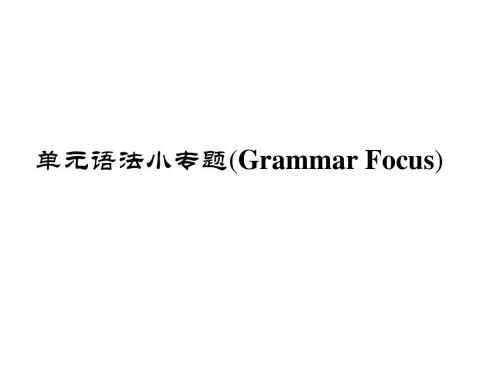
I had finished reading the novel by nine o'clock last night.到昨 天晚上九点钟,我已经读完这部小说。
We had learned over two thousand English words by the end of last term.到上学期末,我们已经学完了超过两千个英语单词了. The bus had already left by the time/when I got there.我到达那 里时,公共汽车已经离开了。
即现在已经知道或了解了这部电影) He said he had never seen such an interesting film before.他说他 以前从没看过这么有趣的电影。(“他说”发生在过去,“看 过”是在“说”之前,是过去的过去)
her bedroom.
3. The train ________(leave)when I got to the station.
Peter had collected more than 300 Chinese stamps by the time he was ten.彼得到10岁的时候已经收集了300多张中国邮票。 (4)过去完成时表示某一动作或状态在过去某时之前已经开始, 一直延续到这一过去时间,而且动作尚未结束,仍然有继续 下去的可能。如: By the end of last year,he had worked in the factory for twenty years.到去年年底为止,他已经在这个工厂工作了20年了。 (已经工作了 20 年,还有继续进行下去的可能)
① 宾语从句中 当宾语从句的主句为一般过去时,且从句的动作先于主句的 动作时,从句要用过去完成时。在told,said,knew,heard, thought等动词后的宾语从句要用过去完成时。如: She said that she had seen the film before.她说她以前看过这部 电影。
人教版九年级英语unit12知识点归纳
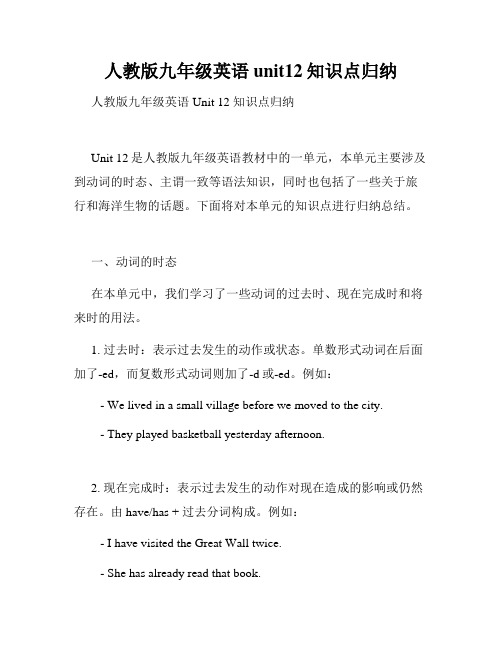
人教版九年级英语unit12知识点归纳人教版九年级英语Unit 12 知识点归纳Unit 12是人教版九年级英语教材中的一单元,本单元主要涉及到动词的时态、主谓一致等语法知识,同时也包括了一些关于旅行和海洋生物的话题。
下面将对本单元的知识点进行归纳总结。
一、动词的时态在本单元中,我们学习了一些动词的过去时、现在完成时和将来时的用法。
1. 过去时:表示过去发生的动作或状态。
单数形式动词在后面加了-ed,而复数形式动词则加了-d或-ed。
例如:- We lived in a small village before we moved to the city.- They played basketball yesterday afternoon.2. 现在完成时:表示过去发生的动作对现在造成的影响或仍然存在。
由have/has + 过去分词构成。
例如:- I have visited the Great Wall twice.- She has already read that book.3. 将来时:表示将来要发生的动作或存在的状态。
由will + 动词原形构成。
例如:- We will go to the beach tomorrow.- They will have a party next week.二、主谓一致主谓一致是指主语和谓语在人称和数上保持一致。
在本单元中,我们需要特别注意以下几点:1. 主语为第三人称单数时,谓语动词需要加-s或-es。
例如:- He often goes to the cinema on weekends.2. 表示时间、距离、金钱等的量词作主语时,谓语动词的单复数形式与它们代表的数量有关。
例如:- Ten yuan is enough to buy a drink.三、旅行话题在本单元中,我们学习了一些与旅行相关的词汇和句型,并通过对话的形式来进行实际应用。
人教版九年级英语Unit12单词、课文,知识梳理,词汇句式精讲
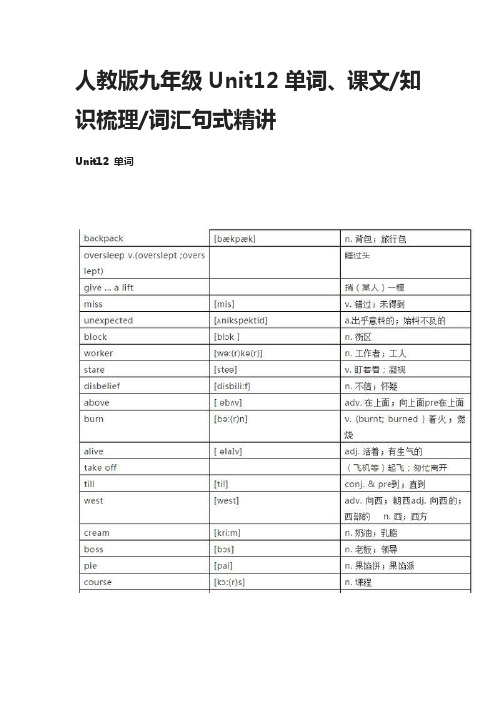
人教版九年级Unit12单词、课文/知识梳理/词汇句式精讲Unit12 单词Unit12 知识梳理【重点短语】1. take a shower洗浴2. leave my backpack at home 把背包忘在家里3. get back to school 返回学校4. start teaching 开始教学5. go off 响铃6. rush out the door 冲出房门7. give sb a lift 捎某人一程8. miss both events 错过两个事件9. full of unexpected 充满着不可预知性10. be about to do sth 正要做某事11. stare in disbelief at 难以置信地盯着。
12. raise above the burning building 从正在燃烧的楼上升起13. jump out of bed 跳下床14. collect the math homework 收数学作业15. complete the work for my boss 完成老板的工作16. make the apple pie 制作苹果馅饼17. show up 赶到,出现18. add the green beans 加绿豆荚【重点句型】1.By the time I got up, my brother had already gotten in the shower. 当我起床时,我哥哥已经进了浴室了。
2.By the time I got outside, the bus had already gone.当我出来时,公汽已经走了。
3.When I got to school, I realized I had left my backpack at home.当我到达学校时,我才意识到我把背包忘在家里了。
4.By the time I walked into class, the teacher had started teaching already.当我走进教室时,老师已经开始讲课了。
人教版英语九年级上册Unit12 知识点详解
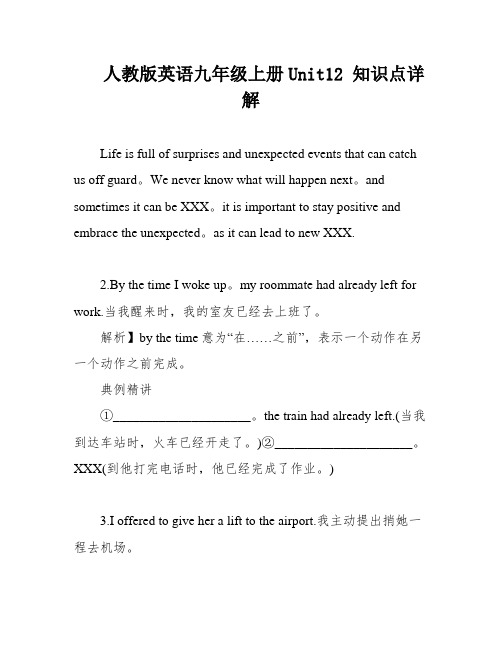
人教版英语九年级上册Unit12 知识点详解Life is full of surprises and unexpected events that can catch us off guard。
We never know what will happen next。
and sometimes it can be XXX。
it is important to stay positive and embrace the unexpected。
as it can lead to new XXX.2.By the time I woke up。
my roommate had already left for work.当我醒来时,我的室友已经去上班了。
解析】by the time意为“在……之前”,表示一个动作在另一个动作之前完成。
典例精讲①_____________________。
the train had already left.(当我到达车站时,火车已经开走了。
)②_____________________。
XXX(到他打完电话时,他已经完成了作业。
)3.I offered to give her a lift to the airport.我主动提出捎她一程去机场。
解析】give…a lift意为“捎(某人)一程”,表示主动提供搭载某人的服务。
典例精讲①Can you _________________________to the train n。
(你能开车送我去火车站吗?)②I___________________________to the supermarket。
(我主动提出开车送她去超市。
)4.The alarm clock went off。
and I rushed out of bed.闹钟响了,我立刻从床上跳起来。
解析】go off意为“响铃”,表示闹钟、警报等声音的响起。
典例精讲①The fire alarm _________________________。
人教版英语九年级全册Unit 12知识点详解及练习
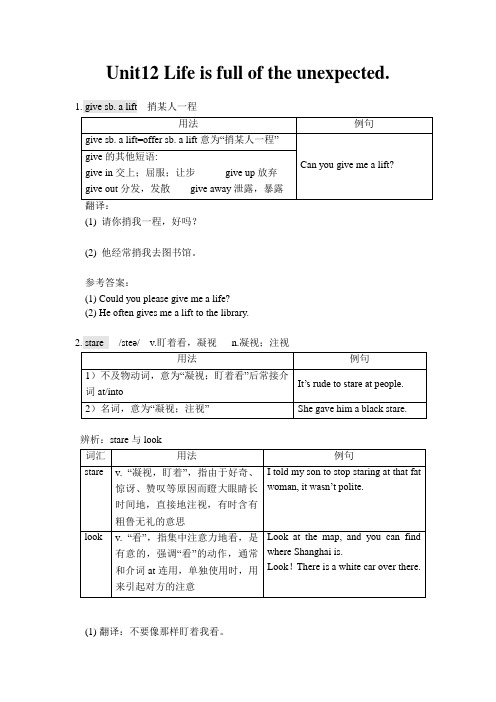
Unit12 Life is full of the unexpected.1. give sb. a lift 捎某人一程(1) 请你捎我一程,好吗?_______________________________________________________________ (2) 他经常捎我去图书馆。
_______________________________________________________________ 参考答案:(1) Could you please give me a life?(2) He often gives me a lift to the library.2. stare /steə/ v.盯着看,凝视n.凝视;注视辨析:stare与look(1)翻译:不要像那样盯着我看。
___________________________________________________________________ (2) Emily ____ the young man hard and finally shamed him into giving up his seatto the old lady.A. stared onB. stared atC. stared forD. stared with参考答案:(1) Don’t stare at me like that.(2) B3. above /əˈbʌv/ prep.在...上面adv.在上面辨析:above,on与over选词填空:above/on/over(1)The plane is flying _____ the clouds.(2)There are five books _____ the desk.(3)There is a bridge _____ the river.(4)I hope the price of the dress will not be____$20.参考答案:(1)above (2)on (3)over (4)above4. burn /bɜ:n/ v.着火;燃烧burn--burnt / burned--burnt / burned辨析:burn, burned与burning(1)翻译:燃烧的旅馆位于城市中心。
人教版九年级上英语第十二单元语法及知识点讲与练 ppt课件

1
九年级年级上 英语第12 语法及知识点
讲与练
2
精品资料
• 你怎么称呼老师? • 如果老师最后没有总结一节课的重点的难点,你
是否会认为老师的教学方法需要改进? • 你所经历的课堂,是讲座式还是讨论式? • 教师的教鞭 • “不怕太阳晒,也不怕那风雨狂,只怕先生骂我
office.
—I’m afraid he________his work yet.
A.doesn’t finish
B.didn’t finish
C.hasn’t finished
D.won’t finish
2.( 08 ).—What did the teacher say just now?
—Sorry.I didn’t catch it.I________something
10
5.(13) 24. ---What ______ the noise, Bill?
---Sorry, I broke my glass.
A. is
B. was
C. has been D. will be
6.( 13 ) 27. ---Hey, Tom. Let’s go swimming.
---Just a moment. I ______ a message.
A.call
B. have called
C.called D.will call 15
本单元知识点: 1. be full of = ( ) Let our life
.---充满--sunshine.
A.is full of B. to full of
C. be filled with D. to fill with 2. 关于show 的词组: talent show ;talk show ;TV show;
人教版九年级英语 习题 Unit 12 单元语法精讲精练
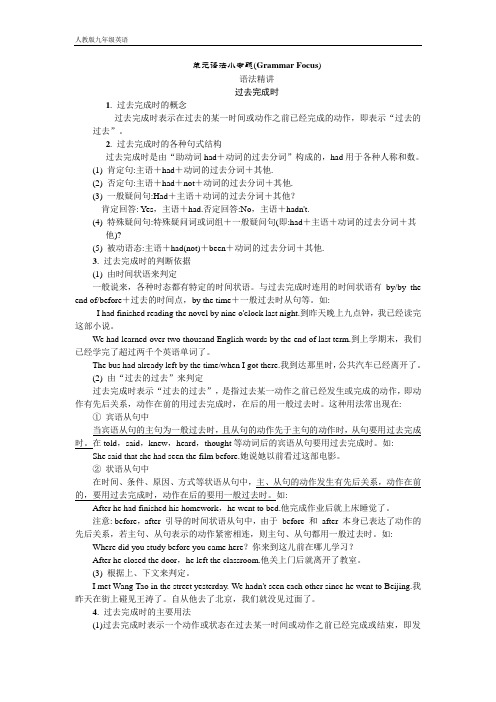
单元语法小专题(Grammar Focus)语法精讲过去完成时1. 过去完成时的概念过去完成时表示在过去的某一时间或动作之前已经完成的动作,即表示“过去的过去”。
2. 过去完成时的各种句式结构过去完成时是由“助动词had+动词的过去分词”构成的,had用于各种人称和数。
(1) 肯定句:主语+had+动词的过去分词+其他.(2) 否定句:主语+had+not+动词的过去分词+其他.(3) 一般疑问句:Had+主语+动词的过去分词+其他?肯定回答: Yes,主语+had.否定回答:No,主语+hadn't.(4) 特殊疑问句:特殊疑问词或词组+一般疑问句(即:had+主语+动词的过去分词+其他)?(5) 被动语态:主语+had(not)+been+动词的过去分词+其他.3. 过去完成时的判断依据(1) 由时间状语来判定一般说来,各种时态都有特定的时间状语。
与过去完成时连用的时间状语有by/by the end of/before+过去的时间点,by the time+一般过去时从句等。
如:I had finished reading the novel by nine o'clock last night.到昨天晚上九点钟,我已经读完这部小说。
We had learned over two thousand English words by the end of last term.到上学期末,我们已经学完了超过两千个英语单词了。
The bus had already left by the time/when I got there.我到达那里时,公共汽车已经离开了。
(2) 由“过去的过去”来判定过去完成时表示“过去的过去”,是指过去某一动作之前已经发生或完成的动作,即动作有先后关系,动作在前的用过去完成时,在后的用一般过去时。
这种用法常出现在:①宾语从句中当宾语从句的主句为一般过去时,且从句的动作先于主句的动作时,从句要用过去完成时。
人教版九年级英语下册复习课件Unit 12 单元语法精讲与精练
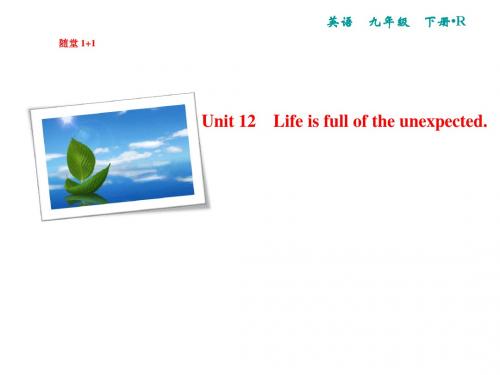
made
apple pies .
By
the
end of yesterday,he hadn't
shown
up
yet.
12. 《小屁孩日记》这本书自出版后受到孩子们的欢迎。 The book Diary of a Wimpy Kid has been popular among kids since it came
(3)主句谓语动词为一般过去时(如 said,asked,found,told,thought 等), 其后的宾语从句通常用过去完成时。 eg:Mr.Yang said that he had lived in this city for twenty years. 杨先生说他已经在这个城市住了二十年。 (4)在含有定语从句的复合句中,如果叙述的是过去的事,先发生的动作常 用过去完成时。 eg:At that moment,I was replying to the e-mail that had arrived two days before. 那时我正在回复两天前收到的电子邮件。
( B )5.She told me that she ____ a cold for three days. A.has caught C.has had B.had had D.had caught
二、用所给动词的适当形式填空。 6.By the time I reached home,my mother had cooked (cook) supper already. 7.Catherine had finished bedroom. 8.The train had left (leave) when I got to the station. 9. The little girl ill. (finish) the letter before her mother came into her
人教版九年级上册第十二单元语法知识点梳理
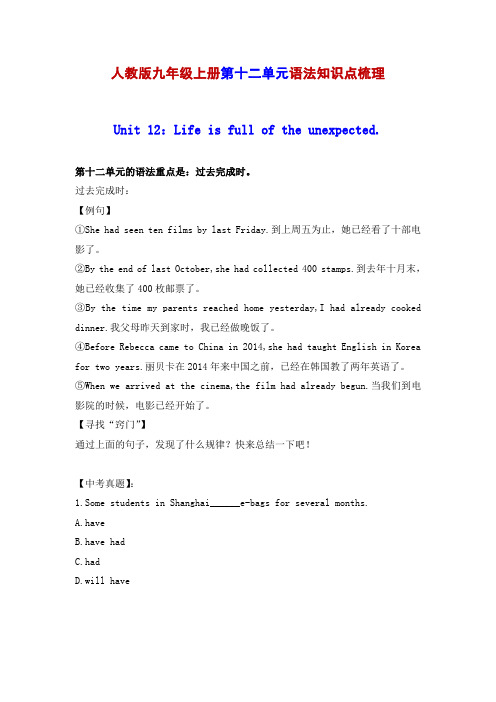
人教版九年级上册第十二单元语法知识点梳理
Unit 12:Life is full of the unexpected.
第十二单元的语法重点是:过去完成时。
过去完成时:
【例句】
①She had seen ten films by last Friday.到上周五为止,她已经看了十部电影了。
②By the end of last October,she had collected 400 stamps.到去年十月末,她已经收集了400枚邮票了。
③By the time my parents reached home yesterday,I had already cooked dinner.我父母昨天到家时,我已经做晚饭了。
④Before Rebecca came to China in 2014,she had taught English in Korea for two years.丽贝卡在2014年来中国之前,已经在韩国教了两年英语了。
⑤When we arrived at the cinema,the film had already begun.当我们到电影院的时候,电影已经开始了。
【寻找“窍门”】
通过上面的句子,发现了什么规律?快来总结一下吧!
【中考真题】:
1.Some students in Shanghai______e-bags for several months.
A.have
B.have had
C.had
D.will have。
九年级-英语--unit12-单元语法精讲精练
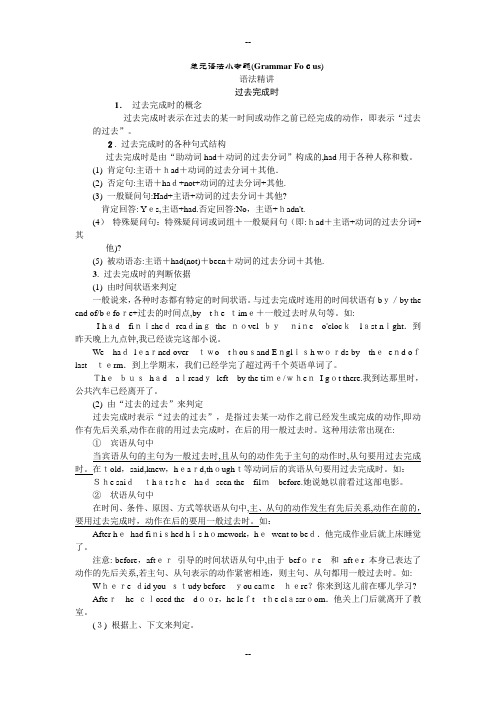
单元语法小专题(Grammar Focus)语法精讲过去完成时1.过去完成时的概念过去完成时表示在过去的某一时间或动作之前已经完成的动作,即表示“过去的过去”。
2. 过去完成时的各种句式结构过去完成时是由“助动词had+动词的过去分词”构成的,had用于各种人称和数。
(1) 肯定句:主语+had+动词的过去分词+其他.(2) 否定句:主语+had+not+动词的过去分词+其他.(3) 一般疑问句:Had+主语+动词的过去分词+其他?肯定回答: Yes,主语+had.否定回答:No,主语+hadn't.(4)特殊疑问句:特殊疑问词或词组+一般疑问句(即:had+主语+动词的过去分词+其他)?(5) 被动语态:主语+had(not)+been+动词的过去分词+其他.3. 过去完成时的判断依据(1) 由时间状语来判定一般说来,各种时态都有特定的时间状语。
与过去完成时连用的时间状语有by/by the end of/before+过去的时间点,by the time+一般过去时从句等。
如:I had finishedreadingthe novel bynine o'clocklast night.到昨天晚上九点钟,我已经读完这部小说。
We hadlearned overtwo thousand English words by theend oflastterm.到上学期末,我们已经学完了超过两千个英语单词了。
Thebushad alreadyleft by the time/whenI got there.我到达那里时,公共汽车已经离开了。
(2) 由“过去的过去”来判定过去完成时表示“过去的过去”,是指过去某一动作之前已经发生或完成的动作,即动作有先后关系,动作在前的用过去完成时,在后的用一般过去时。
这种用法常出现在:①宾语从句中当宾语从句的主句为一般过去时,且从句的动作先于主句的动作时,从句要用过去完成时。
人教版九年级英语Unit12单词、课文知识梳理,词汇句式精讲
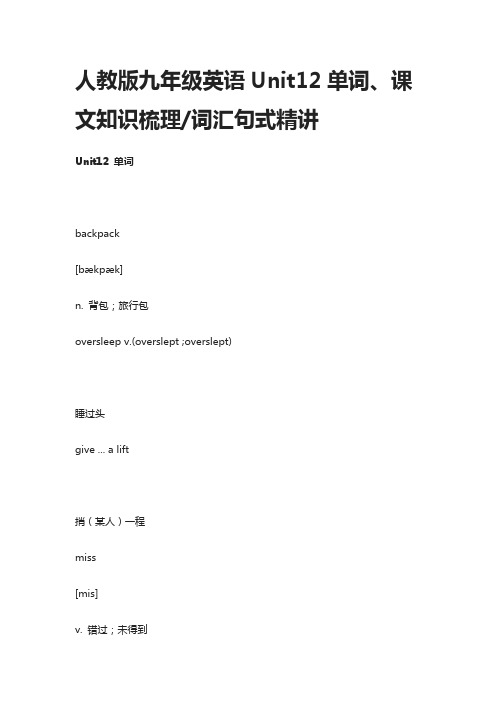
人教版九年级英语Unit12单词、课文知识梳理/词汇句式精讲Unit12 单词backpack[bækpæk]n. 背包;旅行包oversleep v.(overslept ;overslept)睡过头give ... a lift捎(某人)一程miss[mis]v. 错过;未得到unexpected[ʌnikspektid]a.出乎意料的;始料不及的block[blɔk ]n. 街区worker[wə:(r)kə(r)]n. 工作者;工人stare[steə]v. 盯着看;凝视disbelief[disbili:f]n. 不信;怀疑above[ əbʌv]adv. 在上面;向上面pre在上面burn[bə:(r)n]v. (burnt; burned ) 着火;燃烧alive[ əlaIv]adj. 活着;有生气的take off(飞机等)起飞;匆忙离开till[til]conj. & pre到;直到west[west]adv. 向西;朝西adj. 向西的;西部的n. 西;西方cream[kri:m]n. 奶油;乳脂boss[bɔs]n. 老板;领导pie[pai]n. 果馅饼;果馅派course[kɔ:(r)s]n. 课程bean[bi:n]n. 豆;豆荚[ma:(r)kit]n. 市场;集市costume[kɔstju:m]n.服装;装束embarrassed [imbærəst] adj.窘迫的;害羞的announce[ ənauns]v. 宣布;宣告spaghetti[spəgeti]n. 意大利面条hoaxn. 骗局;恶作剧discovery[diskʌvəri]n. 发现;发觉lady[leidi]n. 女士;女子officer[ ɔfisə]n.军官;官员believable[bili:vəbl]adj.可相信的;可信任的embarrassing[imbærəsiŋ]a. 使人害羞的(难堪的或惭愧的)New Zealand[nju:zi:lənd]新西兰Italy[Itəli]意大利Mars[ma:(r)z]火星Carl[ka:(r)l]卡尔(男名)OrsonWelles[ɔ:(r)sən; welz]奥森•韦尔斯Unit12 知识梳理【重点短语】1. take a shower洗浴2. leave my backpack at home 把背包忘在家里3. get back to school 返回学校4. start teaching 开始教学5. go off 响铃6. rush out the door 冲出房门7. give sb a lift 捎某人一程8. miss both events 错过两个事件9. full of unexpected 充满着不可预知性10. be about to do sth 正要做某事11. stare in disbelief at 难以置信地盯着。
九年级英语人教版全一册_Unit12_单元同步语法精讲精练

Unit 12Life is full of the unexpected.第三课时Section A(Grammar Focus-4c)—单元同步语法精讲精练概念:过去完成时表示在过去某一时间或动作之前已经发生或完成了的动作。
它表示动作发生的时间是过去的过去。
结构①肯定句:主语+had+过去分词+其他.②否定句:主语+had not+过去分词+其他.③一般疑问句:Had+主语+过去分词+其他?用法归纳①常与before,by,by the time,by the end of等引导的时间状语(从句)连用。
状语从句的谓语动词常用一般过去式。
eg:By the time I was six,I had started playing table tennis.到我六岁时,我已经开始学习打乒乓球了。
②表示从过去某一时间开始,持续到过去另一时间的动作或状态。
与“for+时间段”连用,谓语动词用延续性动词。
eg:He had been ill for a week when we learned about it.当我们知道这件事时,他已经病了一周了。
③主句谓语动词为一般过去时(如said,asked,found,told,thought等),其后的宾语从句通常用过去完成时。
eg:Mr. Zhang said that he had lived in this city for ten years.张先生说他已经在这个城市住了十年。
④在含有定语从句的复合句中,如果叙述的是过去的事,先发生的动作常用过去完成时。
eg:At that moment,I was replying to the e-mail that had arrived two days before.那时我正在回复两天前收到的电子邮件。
⑤在and或but连接的并列句中,如果前一个并列句为一般过去时,且后一个并列句中的动作早于前一个并列句中的动作,那么后一个并列句要用过去完成时。
unit12知识点精讲精练英语九年级全一册(人教新目标版)
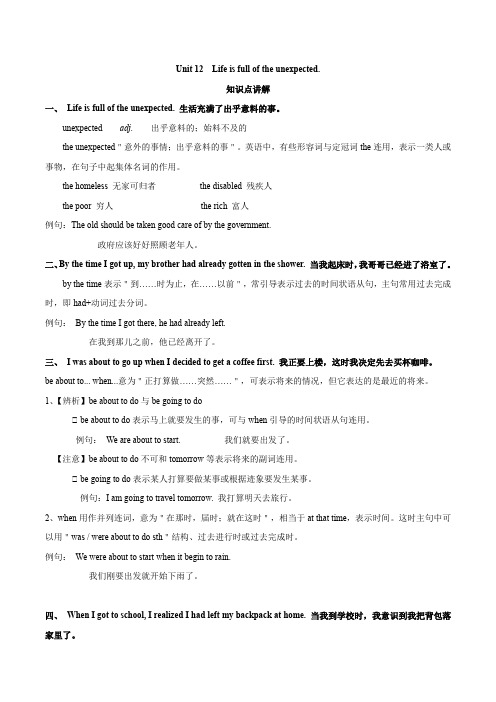
Unit 12 Life is full of the unexpected.知识点讲解一、Life is full of the unexpected. 生活充满了出乎意料的事。
unexpected adj.出乎意料的;始料不及的the unexpected"意外的事情;出乎意料的事"。
英语中,有些形容词与定冠词the连用,表示一类人或事物,在句子中起集体名词的作用。
the homeless 无家可归者the disabled 残疾人the poor 穷人the rich 富人例句:The old should be taken good care of by the government.政府应该好好照顾老年人。
二、By the time I got up, my brother had already gotten in the shower. 当我起床时,我哥哥已经进了浴室了。
by the time表示"到……时为止,在……以前",常引导表示过去的时间状语从句,主句常用过去完成时,即had+动词过去分词。
例句:By the time I got there, he had already left.在我到那儿之前,他已经离开了。
三、I was about to go up when I decided to get a coffee first. 我正要上楼,这时我决定先去买杯咖啡。
be about to... when...意为"正打算做……突然……",可表示将来的情况,但它表达的是最近的将来。
1、【辨析】be about to do与be going to do① be about to do表示马上就要发生的事,可与when引导的时间状语从句连用。
例句:We are about to start. 我们就要出发了。
【注意】be about to do不可和tomorrow等表示将来的副词连用。
人教版九年级英语第十二单元Unit12知识点+习题
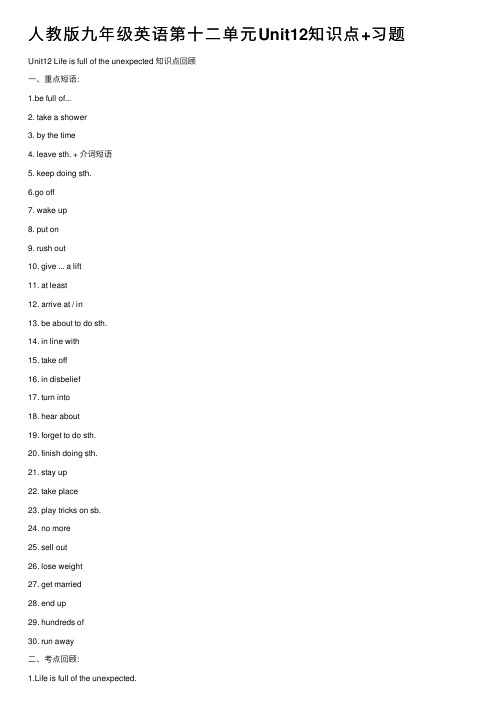
⼈教版九年级英语第⼗⼆单元Unit12知识点+习题Unit12 Life is full of the unexpected 知识点回顾⼀、重点短语:1.be full of...2. take a shower3. by the time4. leave sth. + 介词短语5. keep doing sth.6.go off7. wake up8. put on9. rush out10. give ... a lift11. at least12. arrive at / in13. be about to do sth.14. in line with15. take off16. in disbelief17. turn into18. hear about19. forget to do sth.20. finish doing sth.21. stay up22. take place23. play tricks on sb.24. no more25. sell out26. lose weight27. get married28. end up29. hundreds of30. run away⼆、考点回顾:1.Life is full of the unexpected.【解析1】be full of = be filled with充满,装满①Our life is ______________chances, but there are also a lot of challenges.(充满)②The box is_______________(装满) books.③On hearing the news, her heart was _____ gratitude.A.filled ofB. full withC. filled withD. fill with【2014辽宁丹东】—Look! Here comes Cindy! She is always full of .—So she is. because she takes a lot of exercise every day.A. knowledgeB. courageC. changeD. energy【解析2】unexpected adj. 出乎意料的;始料不及的the unexpected “意外的事情”“出乎意料的事”。
人教PEP英语九年级第12知识点精讲精练带名师解析
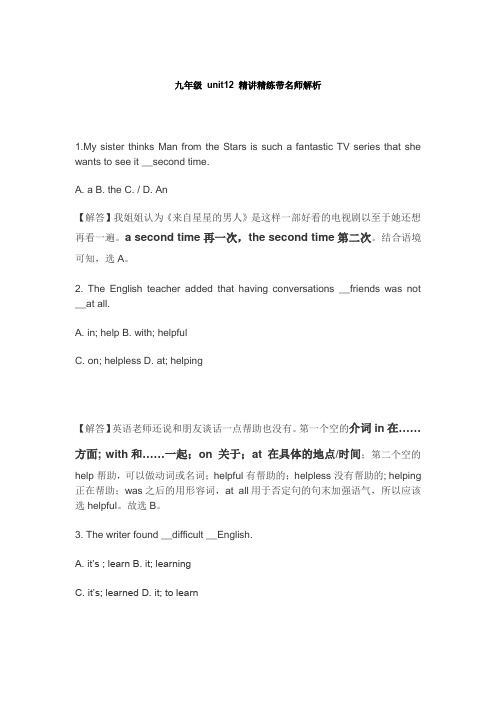
九年级unit12 精讲精练带名师解析1.My sister thinks Man from the Stars is such a fantastic TV series that she wants to see it __second time.A. aB. theC. /D. An【解答】我姐姐认为《来自星星的男人》是这样一部好看的电视剧以至于她还想再看一遍。
a second time再一次,the second time第二次。
结合语境可知,选A。
2. The English teacher added that having conversations __friends was not __at all.A. in; helpB. with; helpfulC. on; helplessD. at; helping【解答】英语老师还说和朋友谈话一点帮助也没有。
第一个空的介词in在……方面; with和……一起;on 关于;at 在具体的地点/时间;第二个空的help帮助,可以做动词或名词;helpful有帮助的;helpless没有帮助的; helping 正在帮助;was之后的用形容词,at all用于否定句的句末加强语气,所以应该选helpful。
故选B。
3. The writer found __difficult __English.A. it’s ; learnB. it; learningC. it’s; learnedD. it; to learn【解答】作家发现学英语很难。
it作形式宾语,动词不定式to learn English 是真正的宾语。
也可以说it’s difficult to learn English。
其他形式不正确。
故选D。
4. ---I don’t know if his uncle __.--- I think he __if it doesn’t rain .A. will come, comesB. will come, will comeC. comes, comesD. comes, will come【解答】我不知道他叔叔是否会来。
九年级英语Unit12 Tom Sawyer知识精讲(II)人教四年制
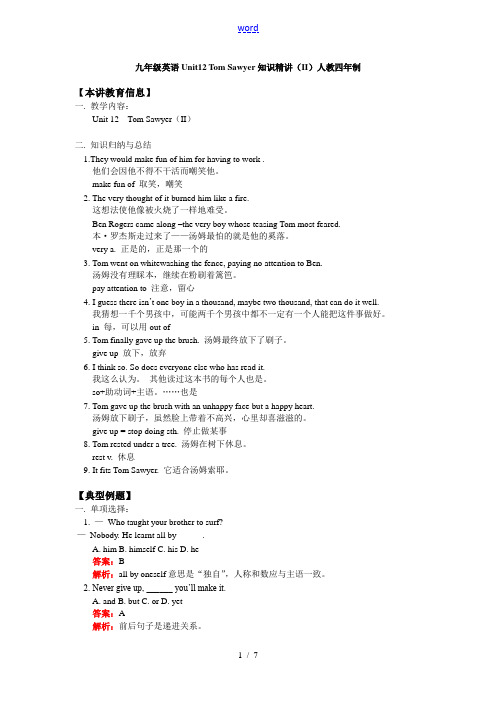
九年级英语Unit12 Tom Sawyer知识精讲(II)人教四年制【本讲教育信息】一. 教学内容:Unit 12 Tom Sawyer(II)二. 知识归纳与总结1.They would make fun of him for having to work .他们会因他不得不干活而嘲笑他。
make fun of 取笑,嘲笑2. The very thought of it burned him like a fire.这想法使他像被火烧了一样地难受。
Ben Rogers came along –the very boy whose teasing Tom most feared.本·罗杰斯走过来了——汤姆最怕的就是他的奚落。
very a. 正是的,正是那一个的3. Tom went on whitewashing the fence, paying no attention to Ben.汤姆没有理睬本,继续在粉刷着篱笆。
pay attention to 注意,留心4. I guess there isn’t one boy in a thousand, maybe two thousand, that can do it well.我猜想一千个男孩中,可能两千个男孩中都不一定有一个人能把这件事做好。
in 每,可以用out of5. Tom finally gave up the brush. 汤姆最终放下了刷子。
give up 放下,放弃6. I think so. So does everyone else who has read it.我这么认为。
其他读过这本书的每个人也是。
so+助动词+主语。
……也是7. Tom gave up the brush with an unhappy face but a happy heart.汤姆放下刷子,虽然脸上带着不高兴,心里却喜滋滋的。
- 1、下载文档前请自行甄别文档内容的完整性,平台不提供额外的编辑、内容补充、找答案等附加服务。
- 2、"仅部分预览"的文档,不可在线预览部分如存在完整性等问题,可反馈申请退款(可完整预览的文档不适用该条件!)。
- 3、如文档侵犯您的权益,请联系客服反馈,我们会尽快为您处理(人工客服工作时间:9:00-18:30)。
单元语法小专题(Grammar Focus)语法精讲过去完成时1. 过去完成时的概念过去完成时表示在过去的某一时间或动作之前已经完成的动作,即表示“过去的过去”。
2. 过去完成时的各种句式结构过去完成时是由“助动词had+动词的过去分词”构成的,had用于各种人称和数。
(1) 肯定句:主语+had+动词的过去分词+其他.(2) 否定句:主语+had+not+动词的过去分词+其他.(3) 一般疑问句:Had+主语+动词的过去分词+其他?肯定回答: Yes,主语+had.否定回答:No,主语+hadn't.(4) 特殊疑问句:特殊疑问词或词组+一般疑问句(即:had+主语+动词的过去分词+其他)?(5) 被动语态:主语+had(not)+been+动词的过去分词+其他.3. 过去完成时的判断依据(1) 由时间状语来判定一般说来,各种时态都有特定的时间状语。
与过去完成时连用的时间状语有by/by the end of/before+过去的时间点,by the time+一般过去时从句等。
如:I had finished reading the novel by nine o'clock last night.到昨天晚上九点钟,我已经读完这部小说。
We had learned over two thousand English words by the end of last term.到上学期末,我们已经学完了超过两千个英语单词了。
The bus had already left by the time/when I got there.我到达那里时,公共汽车已经离开了。
(2) 由“过去的过去”来判定过去完成时表示“过去的过去”,是指过去某一动作之前已经发生或完成的动作,即动作有先后关系,动作在前的用过去完成时,在后的用一般过去时。
这种用法常出现在:①宾语从句中当宾语从句的主句为一般过去时,且从句的动作先于主句的动作时,从句要用过去完成时。
在told,said,knew,heard,thought等动词后的宾语从句要用过去完成时。
如: She said that she had seen the film before.她说她以前看过这部电影。
②状语从句中在时间、条件、原因、方式等状语从句中,主、从句的动作发生有先后关系,动作在前的,要用过去完成时,动作在后的要用一般过去时。
如:After he had finished his homework,he went to bed.他完成作业后就上床睡觉了。
注意: before,after 引导的时间状语从句中,由于before 和after 本身已表达了动作的先后关系,若主句、从句表示的动作紧密相连,则主句、从句都用一般过去时。
如: Where did you study before you came here?你来到这儿前在哪儿学习?After he closed the door,he left the classroom.他关上门后就离开了教室。
(3) 根据上、下文来判定。
I met Wang Tao in the street yesterday. We hadn't seen each other since he went to Beijing.我昨天在街上碰见王涛了。
自从他去了北京,我们就没见过面了。
4. 过去完成时的主要用法(1)过去完成时表示一个动作或状态在过去某一时间或动作之前已经完成或结束,即发生在“过去的过去”。
如:When I woke up,it had stopped raining.我醒来时,雨已经停了。
(“雨停”发生在“我醒来”之前)(2)过去完成时是一个相对的时态,表示的是“过去的过去”,只有和过去某一时间或某一动作相比较时才使用它。
如:He told me that he had written a new book.他告诉我他写了一本新书。
(had written 发生在told 之前)(3)过去完成时需要与一个表示过去的时间状语连用,它不能离开过去时间而独立存在。
此时多与already,yet,still,just,before,never 等时间副词及by,before,until 等引导的短语或从句连用。
如:Peter had collected more than 300 Chinese stamps by the time he was ten.彼得到10岁的时候已经收集了300多张中国邮票。
(4)过去完成时表示某一动作或状态在过去某时之前已经开始,一直延续到这一过去时间,而且动作尚未结束,仍然有继续下去的可能。
如:By the end of last year,he had worked in the factory for twenty years.到去年年底为止,他已经在这个工厂工作了20年了。
(已经工作了20 年,还有继续进行下去的可能)5. 过去完成时与一般过去时的区别(1)时间状语不同:过去完成时在时间上强调“过去的过去”;而一般过去时只强调过去某一特定的时间。
试比较:They had already left when I arrived.我到达时他们已经走了。
(在我“到达”这一过去动作之前,他们就已经“离开”了,因此用had left表示)I saw him in the street yesterday.昨天我在街上看见他了。
(“看见他”这一动作是在“昨天”这一过去的时间发生的)(2)在没有明确的过去时间状语作标志时,谓语动词动作发生的时间先后须依据上下文来判断:先发生的用过去完成时,后发生的则用一般过去时。
如:When I woke up,it had already stopped snowing.我醒来时雪已经停了。
(3)当两个或两个以上接连发生的动作用and 或but 连接时,按时间顺序,只需用一般过去时来代替过去完成时;另外,在before,after,as soon as 引导的从句中,由于这些连词本身已经表示出时间的先后,因此也可以用过去时来代替过去完成时。
如:I (had) heard the news before she told me.她告诉我那个消息之前我已经听说了。
6. 过去完成时与现在完成时的区别过去完成时与already,ever,just,never,since+时间点,for+时间段等连用时,强调事件发生的先后顺序,不涉及现在的情况。
而现在完成时强调的是“过去的动作或状态对现在造成的影响”。
如:She has worked in Chongqing for over two years.她已经在重庆工作两年多了。
(现在仍在那儿工作)She had worked in Chongqing for over two years before she moved to Shanghai.她在搬到上海之前已经在重庆工作两年多了。
(“搬到上海”是过去,“在重庆工作”是发生在过去的过去)He has never seen such an interesting film before.他以前从未看过这么有趣的电影。
(“看”尽管发生在过去,但涉及现在,即现在已经知道或了解了这部电影) He said he had never seen such an interesting film before.他说他以前从没看过这么有趣的电影。
(“他说”发生在过去,“看过”是在“说”之前,是过去的过去)语法精练Ⅰ. 用括号内所给单词的适当形式填空。
1. By the time I reached home,my mother ________(cook)supper already.2. Catherine ________(finish)the letter before her mother came into her bedroom.3. The train ________(leave)when I got to the station.4. The little girl ________(lie)in bed for almost a month since she ________(fall)sick.5. By the end of last year,he ________(learn) 3,000 English words.6. It was the third time that the girl ________(invite)him.7. I ________(not find)the dog until last night.8. He told his mother that he ________(run)out of money to buy new clothes.9. Tom said that he ________(keep) the book for two weeks.10. I suddenly remembered that I ________(leave)the key in my classroom when I________(get)home yesterday.Ⅱ. 按要求完成句子,每空一词。
11. By the time she got up,her mother had gone to work.(对画线部分提问)________ ________ her mother ________ by the time she got up?12. When I got home,my mother had cooked dinner.(改为否定句)When I got home,my mother ________ ________ dinner.13. The train had left when I got to the station.(改为一般疑问句)________ the train ________ when you got to the station?14. John had never seen the film before.(完成反意疑问句)John had never seen the film before,________ ________?15. She had already finished her homework. (改为否定句)She ________ ________ her homework yet.Ⅲ. 根据汉语意思完成句子,每空一词。
